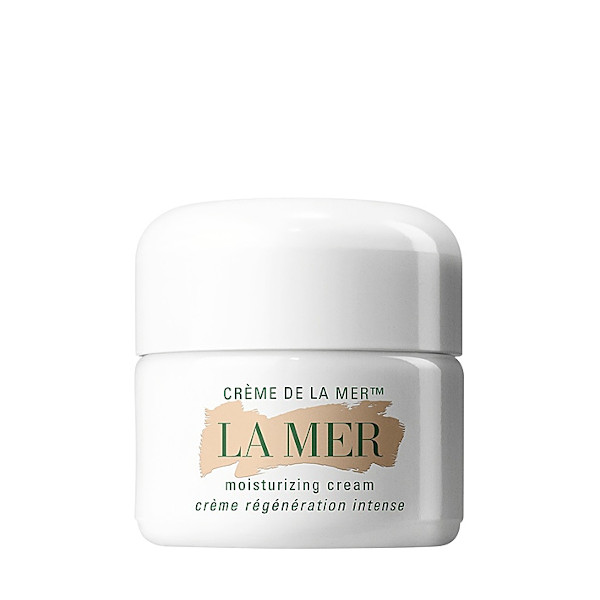Crème de la Mer
Expert Review
Today, we will review La Mer’s bestseller, Crème de la Mer. Let us look closer at the claims the company makes about this product and its ingredients.
Cosmetic Claims
La Mer makes four claims about this bestselling moisturizer. Unfortunately, we could not find any reference to the published scientific literature on this product. La Mer declined to share with the public evidence of this moisturizer’s performance.
-
Helps heal dryness with deep moisture
-
Skin feels soft-to-the-touch, supple and smooth
-
Lines and wrinkles are visibly softened
-
Unlock the power of a radiant transformation, day and night
Legend
Ingredient review and safety:
As there was no clinical study evidence to review, we looked closer to the ingredients list. There are some indications that Crème de la Mer can help to heal dryness, soften lines and wrinkles and make skin soft and smooth because of a high proportion of ingredients with skin conditioning and emollient properties (such as Algae Extract, Paraffinum Liquidum, Petrolatum, Glycerin, Isohexadecane).
Seaweed (Algae) Extract, Mineral Oil\Paraffinum Liquidum\Huile Minerale, Petrolatum, Glycerin, Isohexadecane, Citrus Aurantifolia (Lime) Extract, Microcrystalline Wax \Cera Microcristallina\Cire Microcristalline, Lanolin Alcohol, Sesamum Indicum (Sesame) Seed Oil, Eucalyptus Globulus (Ecalyptus) Leaf Oil, Magnesium Sulfate, Sesamum Indicum (Sesame) Seed, Medicago Sativa (Alfalfa) Seed Powder, Helianthus Annuus (Sunflower) Seedcake, Prunus Amygdalus Dulcis (Sweet Almond) Seed Meal, Sodium Gluconate, Potassium Gluconate, Copper Gluconate, Calcium Gluconate, Magnesium Gluconate, Zinc Gluconate, Paraffin, Tocopheryl Succinate, Niacin, Beta-Carotene, Decyl Oleate, Aluminum Distearate, Octyldodecanol, Citric Acid, Cyanocobalamin, Magnesium Stearate, Panthenol, Limonene, Geraniol, Linalool, Hydroxycitronellal, Citronellol, Benzyl Salicylate, Citral, Methylchloroisothiazolinone, Methylisothiazolinone, Alcohol Denat., Fragrance (Parfum).
Allergen free?

Limonene
Geraniol
Linalool
Hydroxycitronellal
Citronellol
Benzyl Salicylate
Citral
Maximum concentrations do not exceed use guidelines?
Preservative free?

Methylchloroisothiazolinone
Methylisothiazolinone
Maximum concentrations do not exceed use guidelines?
EU restricted ingredient free?

Zinc Gluconate
Maximum concentrations do not exceed use guidelines?
The ingredients listed contain seven different known fragrance allergens which are limited for use by IFRA. This product also contains two preservatives: Methylisothiazolinone and Methylchloroisothiazolinone; which are usually used together. CIR has recently confirmed their safety only when used in formulation below 0.00075%, as they are a strong skin sensitizer. In the EU, the upper limit for their use in cosmetics is 0.0015%. These two parabens are not found in the UK formulation of the same product. Finally, this cream contains Zinc Gluconate which is a biocide and generally recognized as safe. In the EU, it is on the list of restricted ingredients, subject to a maximum concentration of 1% (as zinc) in cosmetics.
Finally, there is one ingredient under the name “Fragrance”. This ingredient can contain any combination of hundreds of chemicals. Most of these components will not have been tested for toxicity. We asked La Mer if the “Fragrance” contains any of the known fragrance allergens or ingredients from the restricted list in the EU. They declined to comment. Although “Fragrance” is last on the list (meaning it has the least amount among all ingredients listed), caution is needed as some controversial ingredients may be undeclared. It would be helpful to see how the product was generally tolerated in the clinical study.
Conclusions

Pros
- Ingredients suggest that it might help:
- skin feel soft-to-the-touch, supple and smooth
- soften lines and wrinkles
- help heal dryness.
Cons
- La Mer’s team is unwilling to share with the consumer any evidence of clinical studies that would support the claims they make for this product.
- Listed ingredients contain seven known fragrance allergens, and other (undeclared) fragrance and preservatives- all of which can be irritating to some individuals and are often limited to maximum concentrations. We could not confirm if the preservatives listed here follow the common safety guidelines and to what extent.

